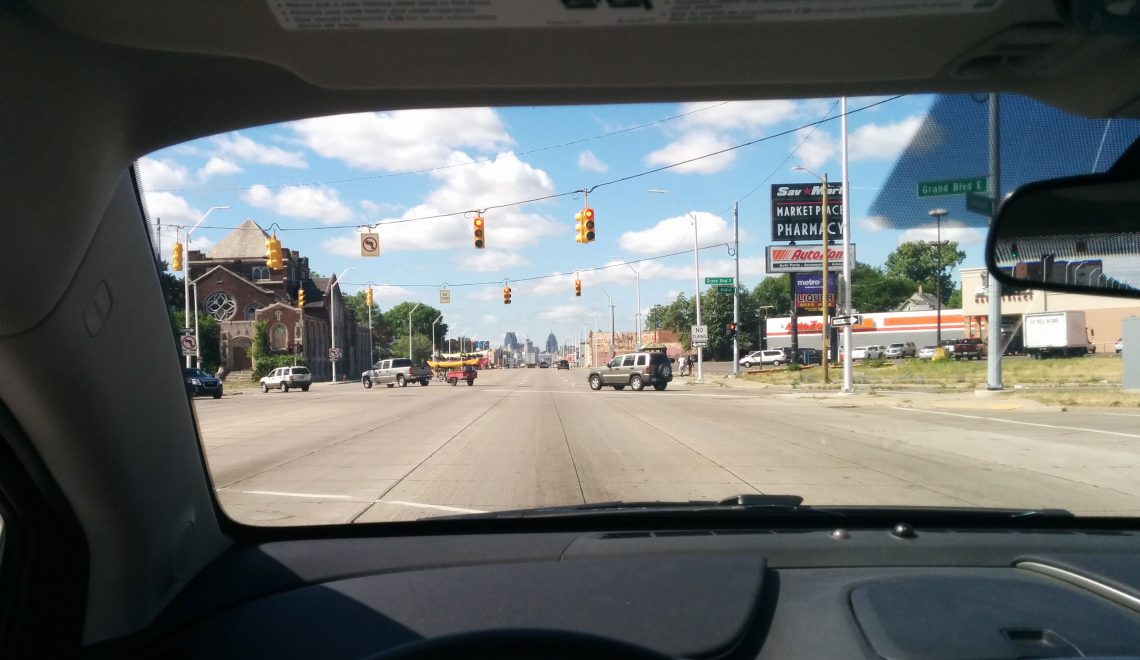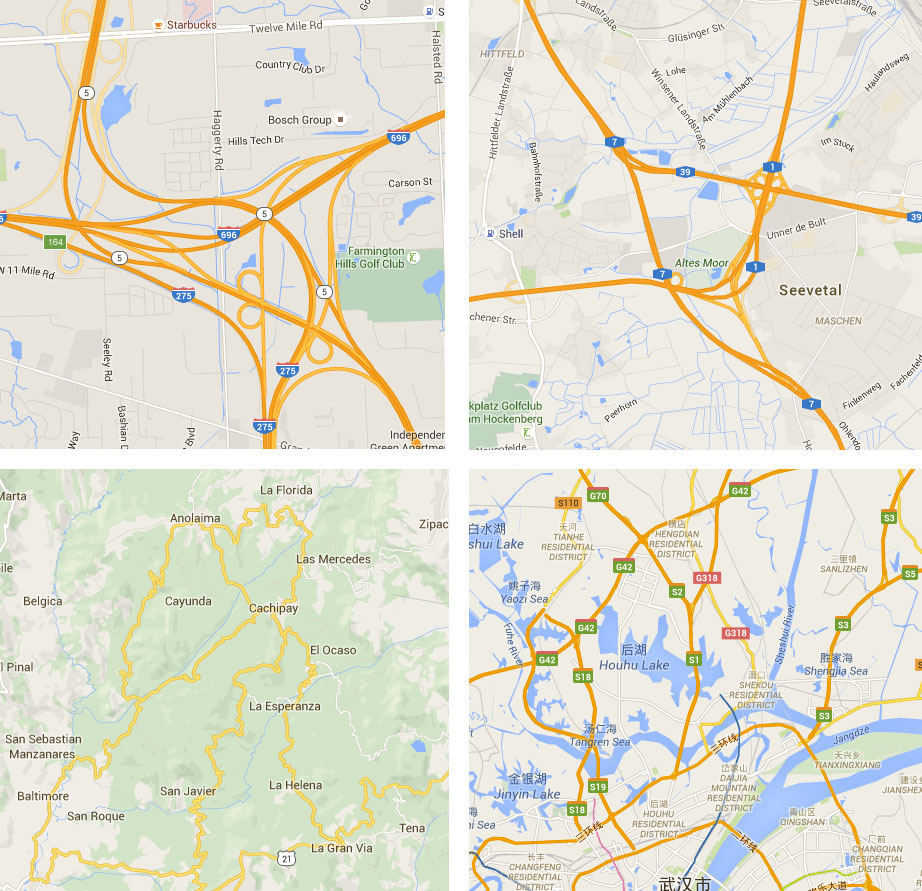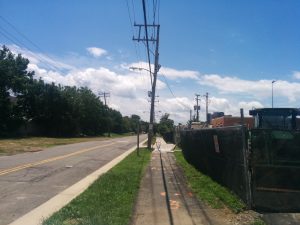3 Reasons Why I Can’t Imagine Living in the USA Again

Having grow up in a land where you can buy lobster, diamonds and camping gear all in one place, then traveling the world for 2 years, I have met many a person that give me a batshit crazy look when I tell them I’m American born and I don’t-don’t-don’t want to live there. I know I’m batshit crazy, but if there’s a reason they’re going to think that then it better not be for not wanting to live there! Many Americans, including my past self, consider the American way of doing things as the *correct* way, because fuck yeah America! You may be confuddled (confused & befuddled) but I have here 3 examples of how we don’t do it better. I was back in states revisiting many familiar places like Chicago, Detroit, Baltimore, DC and their suburbs. And reverse culture shock!
roads, Roads, ROADS
There’s a lotta road here… Take a look at these google map views and guess which city matches which picture: Colombia, Michigan, Germany and Wuhan (some city in China with 10+ million people you’ve never heard of).

Mega squiggles of different complexities!
Like Detroit and many cities across the US, Los Angeles is a city known for being built around the automobile. In 1920 the number of registered cars in LA grew from 161,846 to a whopping 806,264 in 1930 along with the popular belief that cars were the progressive solution to the transportation problems. Additionally the city was plagued with poor investments in privately owned public transportation all which led to what LA has 3 generations later…
One scary side result of this (besides how ugly and loud these sights are) is the effect on our health, our land and a hand full of other things like shrinking water supplies and increased deaths. What confuses me is how people have come to believe that they need a car to survive. Unfortunately many people have made themselves dependent. I find it harder to relate to these people because many people tend to think of gas in terms of price per gallon verses how much poison it’s releasing.
Luckily not all US cities are so dependent on the car. Take Minneapolis for example which was ranked by Forbes as the most bike friendly city in the US with a pollution index one third of LA’s. Minneapolis with it’s subarctic climates doesn’t suspend biking when snow comes either, no, it’s also the best city for biking in the winter. According to the History of Bicycling in Minneapolis, like all developed cities around the world in the early 20th century, Minneapolis rapidly grew it’s network of roads for cars until the fuel shortages and increased environmental awareness of the 70’s. Like Denmark at that time, Minneapolis focused on improving it’s city’s routes.
Shitty Food
The car has made Americans lazy and the food industry has made them fat… Thanks to articles like these, my views are changing that exercise is more a tool to improve health and reduce your susceptibility to sickness than to lose weight. The idea of biking/hiking/walking go out the window for one third of the Americans that are obese and another third that are overweight. In my opinion the cause of this is shitty eating habits due to unhealthy food being more accessible and often times cheaper than healthy food topped with convenience.
My father and I drove to Baltimore from Detroit, we turned off a highway exit in Pennsylvania to eat. Of the 15+ places to eat, the healthiest was Denny’s… This is rural America, stamped out by fast food chains with not a unique nor family owned restaurant in site. America has traded in it’s identity for an increase in productivity and sales.

Get the Flaki soup! (Image Source)
Compare this to a drive through rural Poland where you’re likely to see a building with a sign showing Zajazd Restauracja (Restaurant Inn) where you’ll get cooked meals inspired by Poland’s culture, not some executive’s desire to increase profit margins.
In America you don’t know where your food comes from. Sure, you get it from the grocery store or the drive-through window but how did it get there? Food Inc permanently ruined my appetite for meat in the US and much to my parents annoyance, I will not eat meat in the states unless I know that it came from a farm where the cows grew up naturally.
So Much Land
Compared to Europe and Asia, there’s still a lot of land per person in the USA – 0.5 hectares compared to ~0.1 hectares/person in Germany, yet you’ll be lucky to find a residential house in the suburbs of Detroit or DC that has a vegetable patch. What’s even more ridiculous is that in some parts of the US it’s illegal to grow food in your own garden! A quick google search shows several cases of city officials destroying gardens of citizens who grew their own food instead of accepting food stamps.
I’ve gotten accustomed to countries like Germany where many people have their own dachas, or small plots of land with a small house and a garden full of everything where they go to escape the city. In Lithuania it’s hard to walk anywhere without seeing trees littered with luscious apples ripe for the taking. Many people in Lithuania have gardens where they grow herbs, tomatoes, cukes and radishes and sell them next to the bus stop. That’s normal here, why is that weird in America???
 Another realization is that there’s too many damn fences. Much of the US is literally divided between fenced off residential houses with massive yards, private businesses with fenced off lawns and highways which are fenced off for safety. It’s hard to find a sight that isn’t obstructed with power lines, parking lots, fences and cars. What I believe could be a pretty rural sight is plagued with ugliness.
Another realization is that there’s too many damn fences. Much of the US is literally divided between fenced off residential houses with massive yards, private businesses with fenced off lawns and highways which are fenced off for safety. It’s hard to find a sight that isn’t obstructed with power lines, parking lots, fences and cars. What I believe could be a pretty rural sight is plagued with ugliness.
With better public transportation there would be room for pleasant sites like gardens, parks and in general nature. Take a look at how much space cars take up vs. alternate forms of transportation.
It All Ties in
With the success of the automobile coupled with the post second world war baby boom, people suddenly had the freedom to go where they wanted to and live where they wanted to. According to Domestic Engineering (Oct. 1981), “Three out of five families became homeowners and suburban living became a national phenomenon.” Having grown up and lived in suburban Detroit for 18 years I experienced the ups and downs of this lifestyle. School was: unreachable without a car, not along any public transportation routes and not safe to bike to due to busy roads and no safe routes. Ofttimes I had to wait until 8 at night until my mom could pick me up from school. By then she would often be too exhausted to cook and we would pick up food along the way.
I was fortunate to grow up in a non poverty stricken household, which 45 million americans cannot say for themselves, which means they have a harder time eating healthy. Based on a medical study done by BMJ Open, eating healthy costs on average $1.50 more than eating junkfood. Consider a family of 4 living in poverty, or $24,250/year. For them it would cost an additional $2,190/year, on top of what they already spend on food, to eat healthy. According to Food Research & Action Center “A national study using 1999-2004 data also observed higher obesity rates at lower income levels among all women and White women…”
When you consider: the lack in easily accessible healthy food grown locally, idle time the average American spends sitting in traffic (42 hours – 2015), the money spent on having a car (fuel, insurance, traffic tickets/accidents) and the adverse health effects from carbon emissions vs the potential positive ones by biking/walking to work, it’s clear that there’s something wrong with the American picture.
What’s the Right Way?
As a wannabe social scientist I don’t claim to know the correct way but living in Europe I see a better way. If we used up less space with cars, parking lots and garages and cut down our dependence on cars there would be an increase in free-time, decrease in pollution and unnecessary car related spendings, just to name a few. To do that I believe we need to improve public transportation, create roads for bikes and pedestrians and consider moving into cities.
Here’s an eye-opening Ted Talk by Urbanist Jeff Speck. He explains how we can solve the problem that is suburbia by giving real city examples.
Having shared that, I don’t feel very American. I think Americans focus too much on capitalism and too little on the well being of their citizens. I wish they would be more inquisitive about where their food comes from and consider shopping and growing but who cares what I wish for. You won’t see quick results but look at what 40 years of better urban planning did to Minneapolis and Denmark.
Like with all posts on this blog, they’re purely my opinion, if you have some thoughts on this whether for or against it, please share in the comments. I’ll approve your comment even if you’re disgusted by my opinion.
I originally wrote and concluded this post to bash the US and I don’t think that’s fair since I’m sure there’s buttloads of people that can tell me what’s wrong with my current home. Instead I urge you, if you’re not happy with your home, either move somewhere you want to live, or take a small step in making your home more like the one you want to live in.

